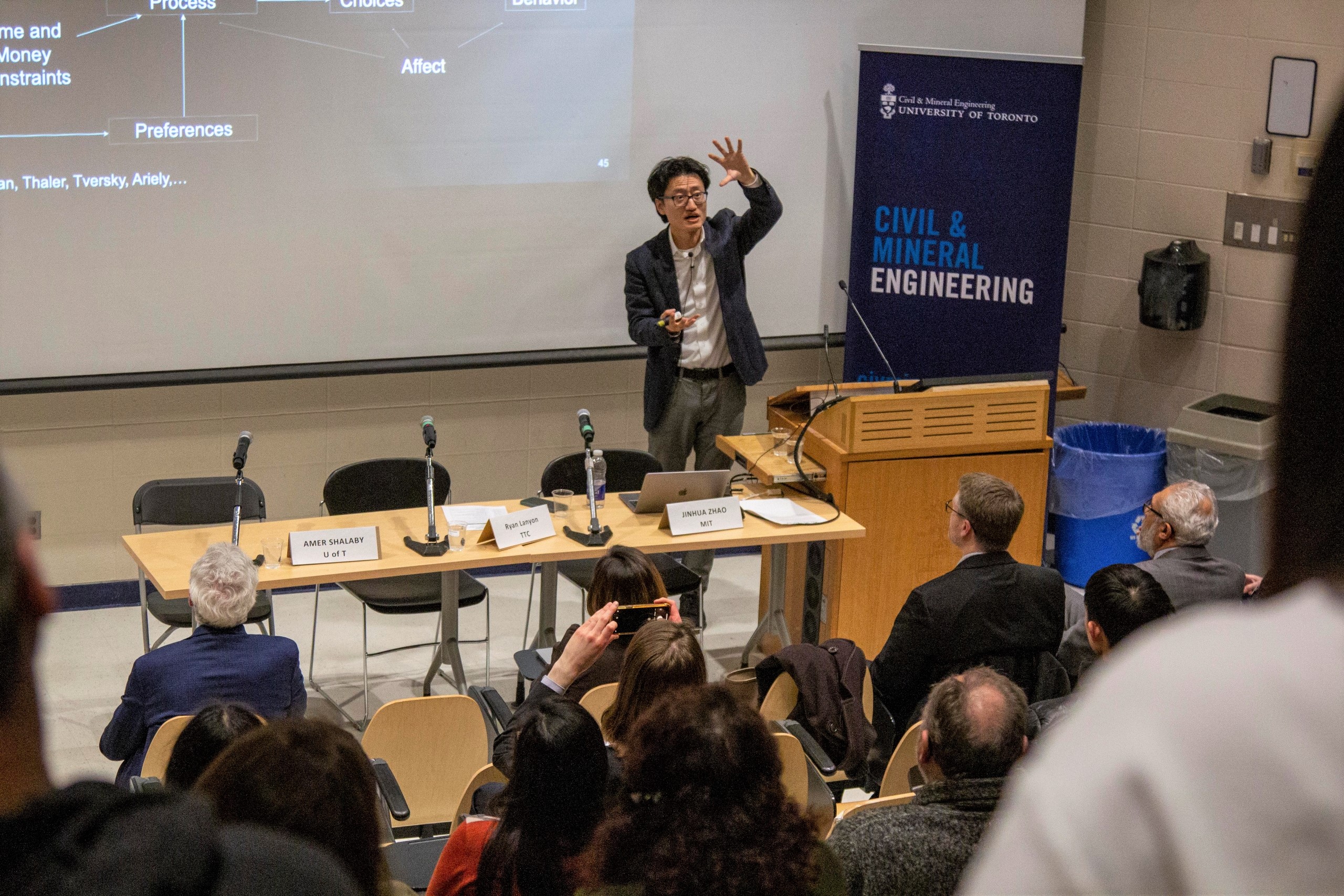Above: Professor Jinhua Zhao delivers Distinguished Lecture at Sidney Smith Hall, University of Toronto, March 27, 2023. (Photo: Pat Doherty).
Mobility Network was proud to co-host a visit by Professor Jinhua Zhao, the Edward and Joyce Linde Associate Professor of City and Transportation Planning at the Massachusetts Institute of Technology (MIT), on March 27 and 28, 2023. Prof. Zhao is well-known for his work at the MIT Mobility Initiative and as the host for the popular virtual weekly seminar series, MIT Mobility Forum.
Zhao came to Toronto to deliver the Distinguished Lecture for the Department of Civil and Mineral Engineering, "Behavior and computation: What defines the future of urban mobility?" the evening of March 27.
Though his visit was short, Zhao was generous with his time. In addition to delivering his public lecture and taking part in the subsequent panel discussion, Zhao met with several U of T faculty, made a guest appearance at Professor Eric Miller's graduate course "Cities as Complex Systems," and met with transportation engineering graduate students at a research roundtable.
The Distinguished Lecture event drew a large crowd.
In his welcoming remarks, Professor Brent Sleep, Chair of the Department of Civil and Mineral Engineering, said, "It's always great to see such a tremendous turnout for these Distinguished Lectures that are transportation-related. Every year I think transportation wins the prize for the widest and greatest and most number of people coming out from not just within the university, but from outside the university as well."
Professor Zhao captured audience attention from the start of his lecture.
I want to introduce a way of looking at transportation that I find rewarding.
Over time, throughout human history, we invented a fantastic set of technologies that help us move from point A to point B. Many from MIT and University of Toronto contributed to some of this design and implementation of the system.
But the question is, is the technology innovation necessarily translating into the betterment of the transportation and mobility system? That's the question I would ask.
Professor Jinhua Zhao, March 27, 2023
He explained his views in detail, drawing from research studies and sharing compelling arguments illustrated with relevant examples that always drove his points home.
Behaviour thinking is really good at identifying opportunities, while computational thinking is the one that offers the foundation, the solution to it. My research really tries to bring the two together. And you bring them together to shape individual behaviour, design systems, and reform policies.
Professor Jinhua Zhao, March 27, 2023
Following his lecture, Zhao joined Ryan Lanyon (TTC) and Professor Amer Shalaby (U of T) for a panel discussion moderated by Professor Marianne Hatzopoulou (U of T).
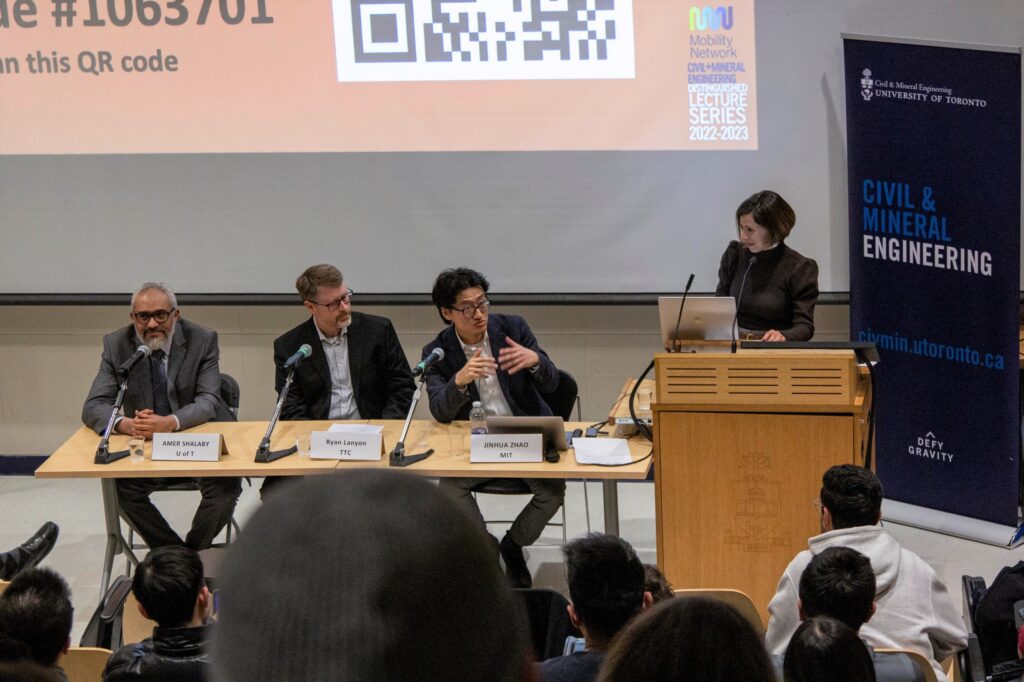
Prof. Hatzopoulou asked the panelists questions received from the audience and also blended in her own questions. Panel discussion topics ranged from a theoretical standard for basic access to mobility as a human right to the social nature of transportation.
Watch the video recording of "Behaviour and computation: What defines the future of urban mobility?"
Abstract
The transportation world is booming but in flux: the industry is being reshuffled, communities and cities are often confused and anxious about their mobility future, and the ecosystem pressure is daunting.
Mobility is in the midst of profound transformation with an unprecedented combination of new technologies: autonomy, electrification, connectivity, and AI, meeting new evolving priorities: decarbonization, public health, and social justice.
In this talk, Professor Zhao sharply focuses on two forces that drive the mobility future: behaviour and computation.
Behaviorally he investigates: Is travel social? Is travel emotional? And is travel perceptual? He uses a behavioural lens to examine mobility technologies and translates business decisions into a set of behavioural inquiries. Every single organization or company exists to change someone’s behaviour.
Computationally, he brings AI and machine learning methods to sense, predict, nudge and regulate travel behaviour. He demonstrates the power of bringing behavioural and computational thinking together, in order to make mobility services predictive, individualized, and experimental. He will illustrate how to design multimodal mobility systems that integrate shared and autonomous services with public transit.
Panel discussion to follow
Following his talk, Professor Zhao will be joined by Ryan Lanyon, Manager of New Technology and Innovation at the TTC, and Professor Amer Shalaby, Director of the Transit Analytics Lab, for a panel discussion moderated by Professor Marianne Hatzopoulou, Director of Positive Zero Transport Futures.
About Professor Jinhua Zhao
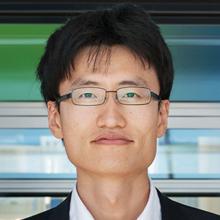
Jinhua Zhao is the Edward and Joyce Linde Associate Professor of City and Transportation Planning at the Massachusetts Institute of Technology (MIT). He integrates behavioral and computational thinking to decarbonize the global mobility system.
Prof. Zhao founded and directs the MIT Mobility Initiative, coalescing the Institute’s efforts on transportation research, education, entrepreneurship, and civic engagement. He hosts the MIT Mobility Forum, curating cutting-edge transportation research across the globe. Prof. Zhao directs the JTL Urban Mobility Lab and Transit Lab at MIT. He leads long-term collaborations with transportation authorities and operators worldwide, including London, Chicago, Washington DC, and Hong Kong and enables cross-culture learning between cities in North America, Asia and Europe. He develops methods to sense, predict, nudge, and regulate travel behavior, and designs multimodal mobility systems that integrate autonomous vehicles, shared mobility, and public transport. He is the co-founder and chief scientist for TRAM Global, a mobility decarbonization venture.
About the panel
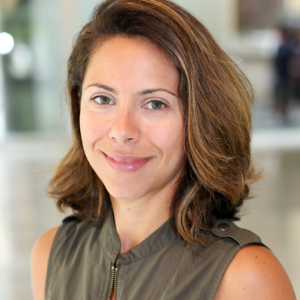
Marianne Hatzopoulou, moderator
Marianne Hatzopoulou is Professor in the Department of Civil and Mineral Engineering at the University of Toronto and Tier 1 Canada Research Chair in Transport Decarbonization and Air Quality. She leads the Transportation and Air Quality (TRAQ) research group studying the interactions between transportation, air quality, climate change, and public health; she published 150 publications on these topics. Prof. Hatzopoulou is also the Director of Positive Zero Transport Futures, a living lab ecosystem for testing transport decarbonization innovations with positive societal outcomes. Prof. Hatzopoulou is on the Canadian team of researchers who were the 2021 recipients of the NSERC Brockhouse Canada Prize for Interdisciplinary Research in Science and Engineering. In 2022, she received the University of Toronto Engineering Alumni Network 2T5 Mid-Career Achievement Award. She is an associate editor of the journal Transportation Research Part D: Transport and Environment and the incoming chair for the Transportation Research Board Standing Committee on “Air Quality and Greenhouse Gas Mitigation” (2023-2026).

Ryan Lanyon
Ryan Lanyon is the Manager of New Technology and Innovation at the TTC, having recently joined after a decade with the City of Toronto. Ryan has been working in local government for more than 20 years, starting out in demand management and providing online ridematching services to commuters. More recently, Ryan led the West Rouge Automated Shuttle Trial, developed the Transportation Innovation Zone at Exhibition Place, and recommended policies to City Council regarding micromobility. Ryan is also learning and researching methods of applying strategic foresight to prepare Toronto's transportation system for emerging and future transportation technologies.
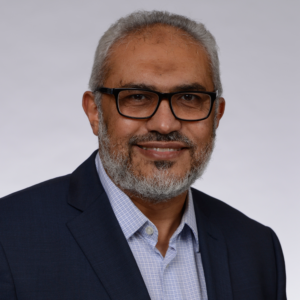
Amer Shalaby
Dr. Shalaby is Professor and Bahen/Tanenbaum Chair in Civil Engineering at the University of Toronto. He is the founding Director of the Transit Analytics Lab (TAL) and Co-Director of the Centre for Automated and Transformative Transportation Systems (CATTS). Dr. Shalaby is specialized in transit planning and scheduling, intelligent transit systems, transit operational management, transit system resilience, automated and connected transit technologies, and simulation and modelling of transportation systems. He has served on various technical committees and journal editorial boards. He also served on advisory panels of multiple transportation projects in Canada and internationally.
This free event was presented by the Department of Civil & Mineral Engineering Distinguished Lecture Series and co-sponsored by Mobility Network.

